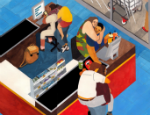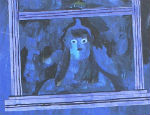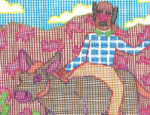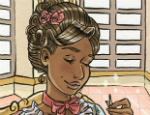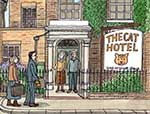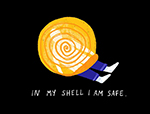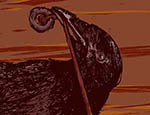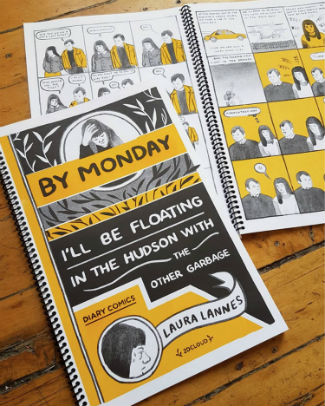 The task of the memoirist is much like that of any documentarian; sorting through millions of moments to edit and frame them for the audience. Laura Lannes’ By Monday I’ll Be Floating in the Hudson with the Other Garbage is a series of raw snapshots during a fraught emotional time in her life. We watch her life over the course of a month during which she is lead on, jilted, screwed over, and disappointed romantically. As she struggles with the uncontrollable narrative of her life, she also engages with how documenting it through her comics allows her some control over said narrative. Lannes’ soft watercolor linework and her tight framing on figures then allow the reader to fill in the missing portions and make part of the story their own.
The task of the memoirist is much like that of any documentarian; sorting through millions of moments to edit and frame them for the audience. Laura Lannes’ By Monday I’ll Be Floating in the Hudson with the Other Garbage is a series of raw snapshots during a fraught emotional time in her life. We watch her life over the course of a month during which she is lead on, jilted, screwed over, and disappointed romantically. As she struggles with the uncontrollable narrative of her life, she also engages with how documenting it through her comics allows her some control over said narrative. Lannes’ soft watercolor linework and her tight framing on figures then allow the reader to fill in the missing portions and make part of the story their own.
By Monday I’ll Be Floating in the Hudson with the Other Garbage documents events in Lannes’ life from early February to early March. We see the small moments of her interacting with her roommates, attending Democratic Socialist meetings, fielding emails at her job, and browsing for dates on Tinder. Nothing too out of the ordinary for a 25-year-old living in New York City, but things already begin to ring sour when we see her fighting with her potential matches over whether Nazis should get punched. A whole host of men disagree with Laura, and on top of that both her vibrators and a visiting paramour are out of commission.
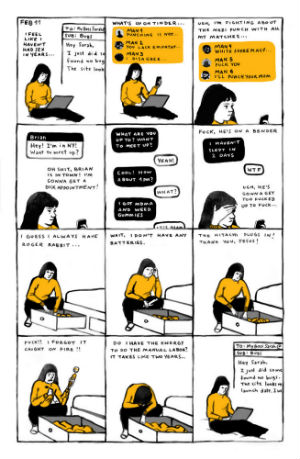 Given these circumstances it becomes less surprising that she continues to engage with the complexities of her romance with the in-an-open-relationship Francesco. This is the primary focus of the story, not just their relationship but the way in which it casts a shadow over Laura’s interactions with the other men she is seeing. Other boyfriends are a poor stand-in for Fran, either emotionally or sexually. Her interactions with them are stilted and mundane, the sex disappointing. With Fran she feels “an inexplicable intimacy.” Yet no matter how much she wants him to, Fran will never leave his primary partner for Laura. In the end all her partners will have failed her and she returns dejected to the tools under her bed.
Given these circumstances it becomes less surprising that she continues to engage with the complexities of her romance with the in-an-open-relationship Francesco. This is the primary focus of the story, not just their relationship but the way in which it casts a shadow over Laura’s interactions with the other men she is seeing. Other boyfriends are a poor stand-in for Fran, either emotionally or sexually. Her interactions with them are stilted and mundane, the sex disappointing. With Fran she feels “an inexplicable intimacy.” Yet no matter how much she wants him to, Fran will never leave his primary partner for Laura. In the end all her partners will have failed her and she returns dejected to the tools under her bed.
Not everything is bleak. As much as Laura is at the mercy of these men and her own conflicting emotions she is also aware that by documenting these incidents she is shaping her own narrative. She starts to reframe the experience by frequently undercutting moments of sadness with moments of mundanity or comedy. Finding her vibrators non-operational Laura returns to her work emails; deep in her frustrations about even wanting to date her roommate brings in cookies; a break-up cry at work is concluded with Laura putting on a team player face for her boss; and after occasional partner Peter gets too high to leave the bed during Mardi Gras the final panel of the page is Laura’s cartoon eyes in the darkness. Bad things happen to her, but she is not a victim.
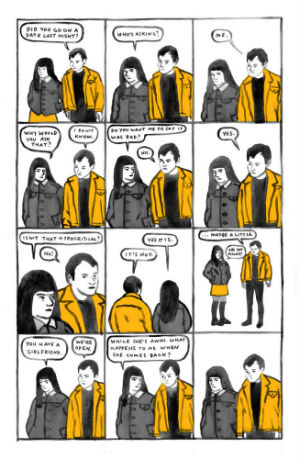 Multiple times she returns to the line “Time does what it can. It passes,” and this seems to be the question for Laura, if she is not a passive participant then exactly what agency does she have? In one panel she thinks to herself that, “making these diary comics is my dating.” The kind of self-reflection required in creating work as revealing as I’ll Be Floating in the Hudson is in itself a love of self. Even when she is being emotionally trampled, Lannes values her own existence enough to document and try to piece out what is happening to her. Even when furious at Fran she relishes his compliments about her work and its ability to speak to others, at which point she breaks the fourth wall pointing and winking to the reader saying “for you.”
Multiple times she returns to the line “Time does what it can. It passes,” and this seems to be the question for Laura, if she is not a passive participant then exactly what agency does she have? In one panel she thinks to herself that, “making these diary comics is my dating.” The kind of self-reflection required in creating work as revealing as I’ll Be Floating in the Hudson is in itself a love of self. Even when she is being emotionally trampled, Lannes values her own existence enough to document and try to piece out what is happening to her. Even when furious at Fran she relishes his compliments about her work and its ability to speak to others, at which point she breaks the fourth wall pointing and winking to the reader saying “for you.”
In rendering these humiliating moments through her comics with full knowledge that they are being presented for a reader does she hope to have the recorded communal version inevitably supersede the experienced versions? If Lannes is able to mine the moments for art, does that let her regain control of them? Can something good come from something awful? In creating this work she seems to be asking these questions of both herself and, by extension, the reader.
Lannes’ artistic style leaves a lot of room for the reader to form their own answers to these questions. Her loose watercolor linework and simple cartooning style lets us create our own picture of Laura, Fran, et al. By sketchily rendering the participants, changing their names – even going so far as to give Peter a dog’s head – Lannes is aware of, and letting the audience know she is aware of, the conceits involved in making an autobiographical comic. We can be given an incredible intimate view of the participants’ lives, shown their text messages to one another, and yet it will only ever be a simulation of the real. The reader creates the participants’ faces and voices, fills in the intricacies of their emotions, so that as much as this is Laura’s story, this is our story of Laura’s story.
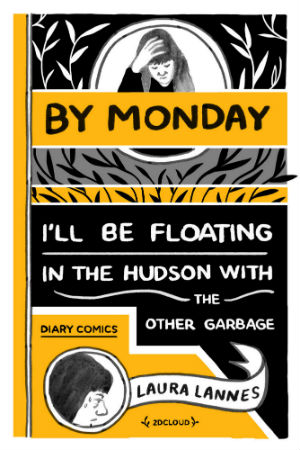 This makes the lack of detail in many panels more forgivable. Not only is this not a story where setting is of the utmost importance, Lannes wisely composes her panels in terms of figures and text so that panels rarely feel sparse or incomplete. She has chosen to focus on the elements she sees as of importance, leaving the rest to the reader’s imagination. The other interesting choice on display here is the use of deep yellow as a highlight color on the page. It is an almost sunshine-y color for a story that takes place in winter and rarely during the day. It gives everything a sickly pall and creates the right emotional tone. Not one of dread, or despair, or even misery, but one of fatigue, of being worn down and drained.
This makes the lack of detail in many panels more forgivable. Not only is this not a story where setting is of the utmost importance, Lannes wisely composes her panels in terms of figures and text so that panels rarely feel sparse or incomplete. She has chosen to focus on the elements she sees as of importance, leaving the rest to the reader’s imagination. The other interesting choice on display here is the use of deep yellow as a highlight color on the page. It is an almost sunshine-y color for a story that takes place in winter and rarely during the day. It gives everything a sickly pall and creates the right emotional tone. Not one of dread, or despair, or even misery, but one of fatigue, of being worn down and drained.
By Monday I’ll Be Floating in the Hudson with the Other Garbage is a fearless release for Lannes. It is a revealing portrait of a young woman trying to navigate modern romance that showcases Lannes’ distinct voice and unique stylization. Readers can feel her pain and frustration, but also appreciate her candor and bravery in turning this negative experience into compelling art. It’s a testament to her abilities as an artist that such a specific story can present readers with so much to latch onto.
Laura Lannes (W/A) • 2dcloud, $25.00
Review by Robin Enrico





